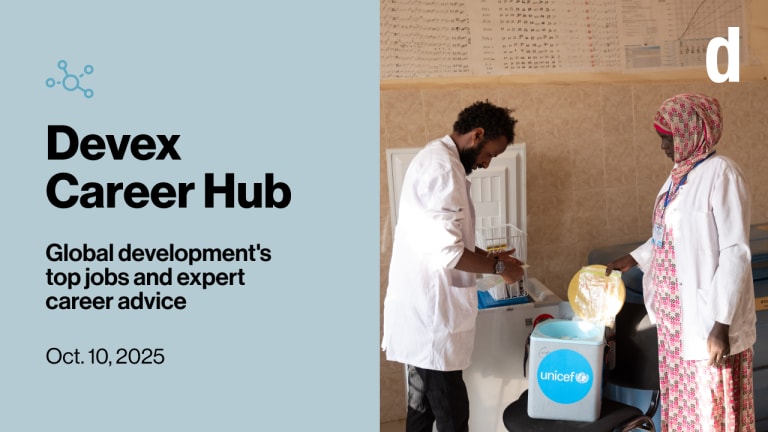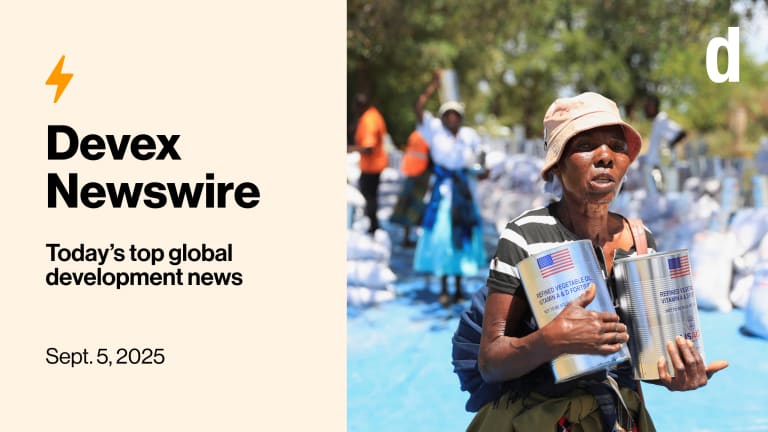Presented by Climate Action

The humanitarian emergency in Sudan is dire, but many aid groups have been forced to sit on the sidelines, watching and waiting for a potential famine to unfold.
Also in today’s edition: BRAC wants to become a household name, and we look at how climate change is playing out in Zimbabwe and Asia.
+ How well do you remember the past month's headlines? Test your memory by taking our five-item news quiz!
Denied entry
Gaza has, understandably, overtaken the humanitarian headlines, but another crisis looms large: Sudan, where a civil war has killed thousands, displaced millions, and left nearly half of the population — 25 million people — in desperate need of food and medical aid.
But aid groups say they’re just as desperate — to get visas to go into the country before famine strikes, my colleague Rob Merrick reports.
This is a preview of Newswire
Sign up to this newsletter for an inside look at the biggest stories in global development, in your inbox daily.
Anthony Neal, the coordinator of the INGO Forum for Sudan, representing 52 aid groups working in the country, tells Rob they have been pleading for multientry visas for six months, without success.
“We don’t have time for this type of delay, for this bureaucracy. Without substantial change in the posture of the Sudan government, millions of people will die when that could be prevented,” he warns, adding: “More could be done by the diplomatic community to address this visa issue.”
Over 100 applications are currently stalled, and the visas that have been issued last for only two months. They are also single entry, preventing workers from returning to Sudan if they leave during that period.
In contrast, staffers working for the World Food Programme and other U.N. organizations receive multientry visas for at least six months, often lasting for up to one year, INGOs in Sudan say.
Read: Sudan visa curbs fuel risk that ‘millions will die,’ aid groups warn
ICYMI: Global hunger levels ‘bleak’ amid wars in Sudan and Gaza
Name check
BRAC is a big deal. In fact, it’s often referred to as the “world’s largest NGO.” Yet it’s not a household name in the way that Oxfam, Red Cross, or UNICEF are. BRAC USA’s incoming CEO wants to change that.
She’s off to a good start, at least when it comes to name recognition. After all, the name Julia Roberts is sure to have people doing a double take when they assume it’s the iconic actor, although this Roberts hails from the world of development, not Hollywood.
Roberts tells Devex contributor Rebecca Root that one reason why BRAC hasn’t become as well-known among the general public is that it has been “out getting the work done.” But promoting its reputation, she believes, is important as the NGO founded in 1972 works to foster new partnerships amid rising poverty and polycrisis.
“Globally, there's a movement of partnerships. There's so many tail winds that are pushing us in the right direction. At the same time, there are obviously headwinds,” she says, citing debt ratios of lower-income countries and humanitarian, climate, and political crises.
Despite this litany of crises, she says: “It's exciting because there's both this enormous problem and an enormous solution that can match it. BRAC has proven ways in which you provide solutions and tools for people to lift themselves out of poverty, not just for today, but for tomorrow, for their family, and for the future.”
Read the Q&A: BRAC USA’s new chief wants to make the NGO a household name (Pro)
+ A Devex Pro membership gives you access to all our expert analyses, funding data, exclusive events, networking opportunities at our summits, and more. Not a Pro member yet? Start your 15-day free trial today.
El Niño’s wrath
Scientists say climate change has supercharged the weather phenomena known as El Niño and La Niña, causing unusual droughts, floods, and heat waves worldwide.
On the ground, that’s translated into economic disaster for people like Moses Kumbweya, a small-scale farmer in Zimbabwe who watched helplessly as his lush green lettuce crop withered into dried brown leaves because of disrupted rainfall patterns caused by El Niño.
He estimates he’s lost $8,000 and says climate change effects have “struck closer to home.”
The government is trying to take action, writes Lungelo Ndhlovu for Devex. Zimbabwean President Emmerson Mnangagwa declared a national disaster last month, and his administration has been working on a climate change law to advance mitigation and adaptation.
“We need to realize climate change is a reality that we have as a country,” says Khumbulani Maphosa, director of the Matabeleland Institute for Human Rights, who praised the law. “It is important that we stop crying and complaining about climate change but come up with mechanisms that will ensure our people are more resilient to climate change and can also mitigate [its] adverse impacts.”
Read: As El Niño bites, Zimbabwe takes aim at climate change with new law
Into the blender
While Africa is often seen as ground zero for climate change, it’s hardly the only region buffeted by out-of-control weather patterns.
Asia hosts 60% of the world’s population, bore the brunt of climate-related disasters last year, and is heating up faster than the global average. It also requires $1.1 trillion annually for its adaptation and mitigation needs, but only receives $333 billion.
At the same time, it’s a region that has seen a steady growth in the use of blended finance structures for climate and has a healthier mix than other regions when it comes to financing for mitigation and adaptation.
It’s against this backdrop that over 1,500 investors, philanthropists, the private sector, and government officials from around Asia converged on Abu Dhabi last week to discuss leveraging more private capital to address development challenges such as climate change. They met as part of the flagship conference hosted by AVPN, the largest network of social investors in Asia.
Blended finance has the potential “to unlock vast pools of capital, where traditional philanthropy and government aid alone cannot address,” Vikas Arora, chief of impact investing at AVPN, told the conference attendees.
But it also comes with challenges, including the sheer complexity of such deals. And there’s the need to bring the right partners together, AVPN’s Tristan Ace told my colleague Sara Jerving.
"It's just people willing to roll their sleeves up and really, kind of figure out how to coordinate all these different actors,” he said.
Read: What the world could learn from Asia's experience with climate finance (Pro)
ICYMI: Climate adaptation finance must double by 2025. How will that happen? (Pro)
Networking for haters
I confess: I’m not a fan of networking. All that tedious small talk about the weather. Or the awkwardness of inserting yourself into a circle of people who are already mingling
But networking is not only essential to professional success, it offers the chance to meet fascinating people from all walks of life. Like it or not, it’s a skill we all need to master.
It’s also a skill that can be learned, even by introverts, says development career expert Simone Anzböck, who offers helpful networking tips and dispels common misconceptions.
Among them is the belief that “relationships should form naturally [and that] we shouldn’t have to work on them — we should just click with the other person.”
Anzböck explains that “if we let our relationships form naturally, then we're more likely to end up with people that are just like you, and people that we basically bump into randomly, like our neighborhood and the gym.”
This may be convenient, but not diverse.
“You should be strategic about networking, meaning, go out of your way a bit and think about where you might bump into people that you're interested in,” says Anzböck, who even came up with a matrix for how to pick and choose events to attend.
Watch: 5 tips for people who hate networking (Career)
+ Devex Career Account members can join for free our event tomorrow on how to cultivate resilience for career growth. Save your spot now.
Not a Devex Career Account member yet? Try it out with a free 15-day trial to access all career advice articles, our complete job board, members-only workshops, and much more.
In other news
The U.N. is urging South Sudan to waive new taxes and fees that increased the operational costs for delivering aid to inaccessible populations. [AP]
A Greek court has dropped charges against 35 aid workers over insufficient evidence of wrongdoings, including spying and facilitating illegal entry into the country. [The Guardian]
Imposing a limit on plastic production was one of the most contentious issues at the latest round of negotiations toward a global plastic treaty that wrapped up Tuesday in Canada. [Reuters]
Sign up to Newswire for an inside look at the biggest stories in global development.








